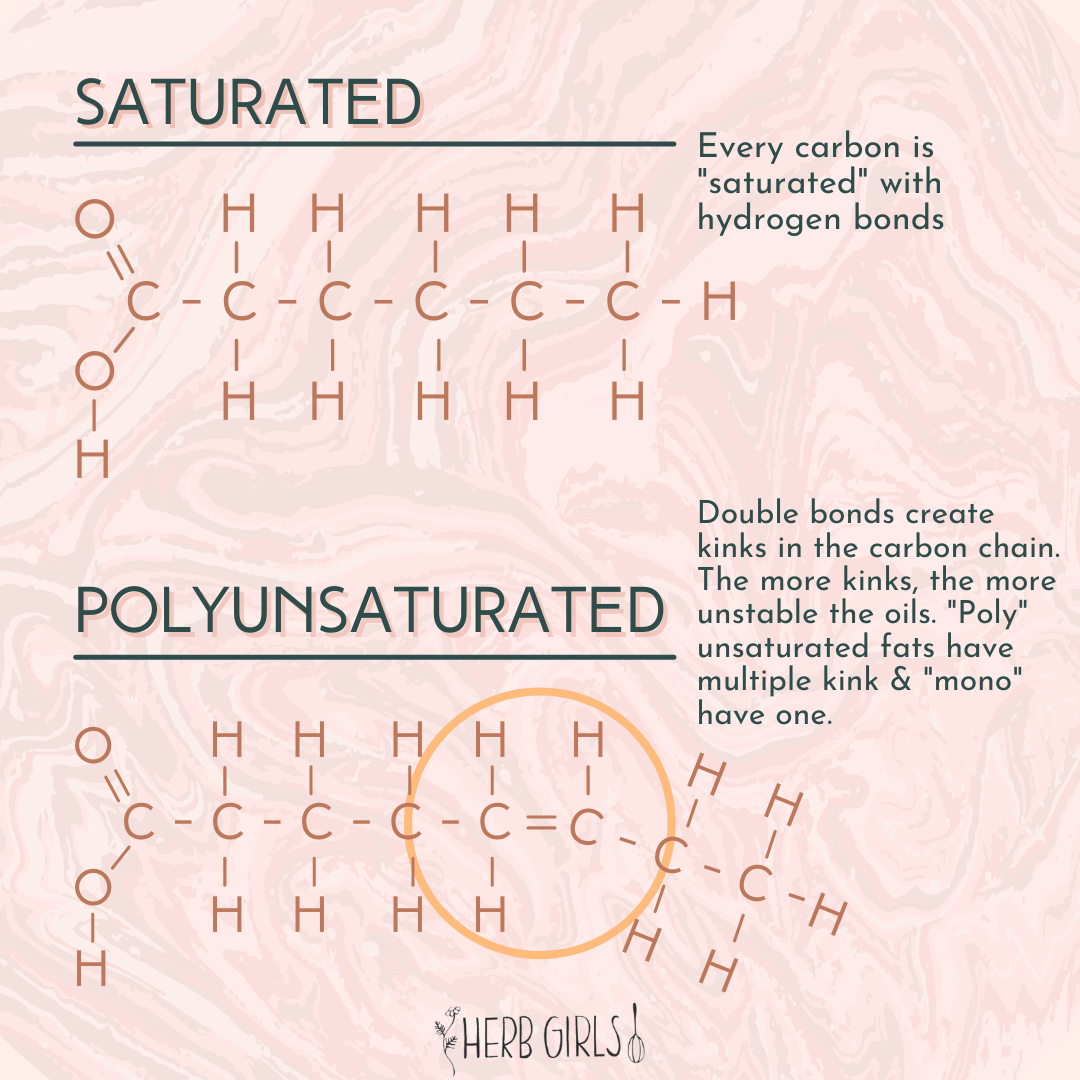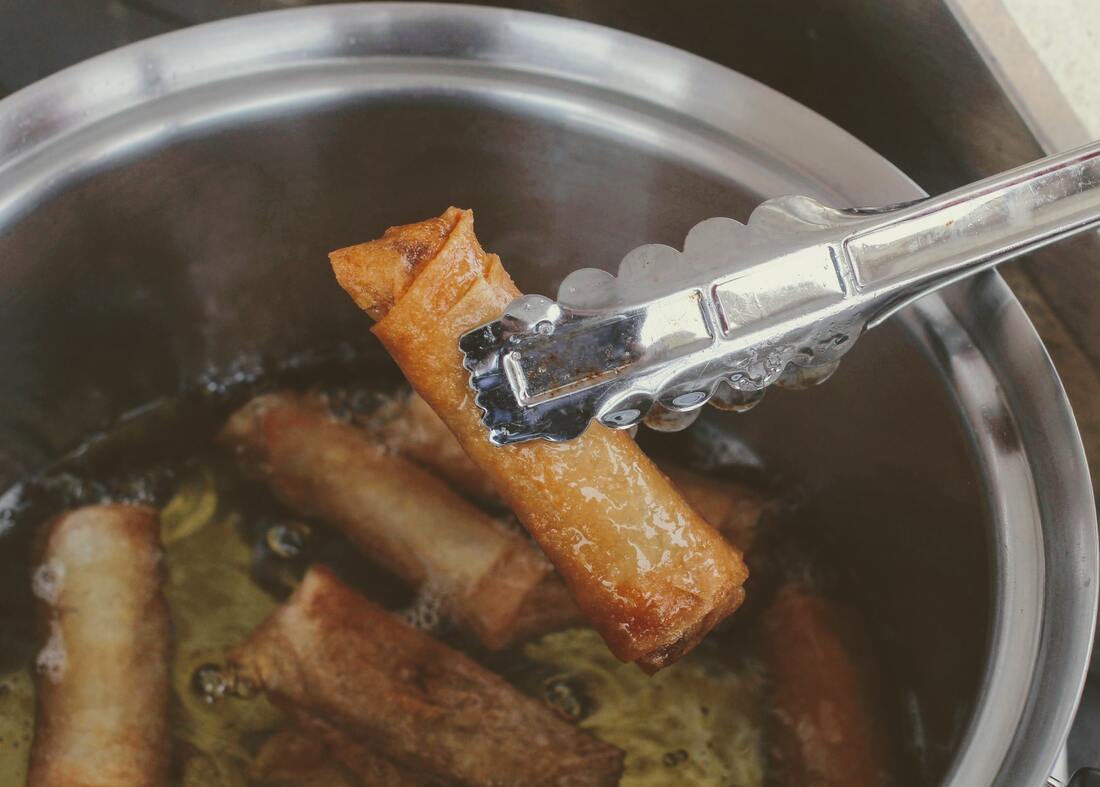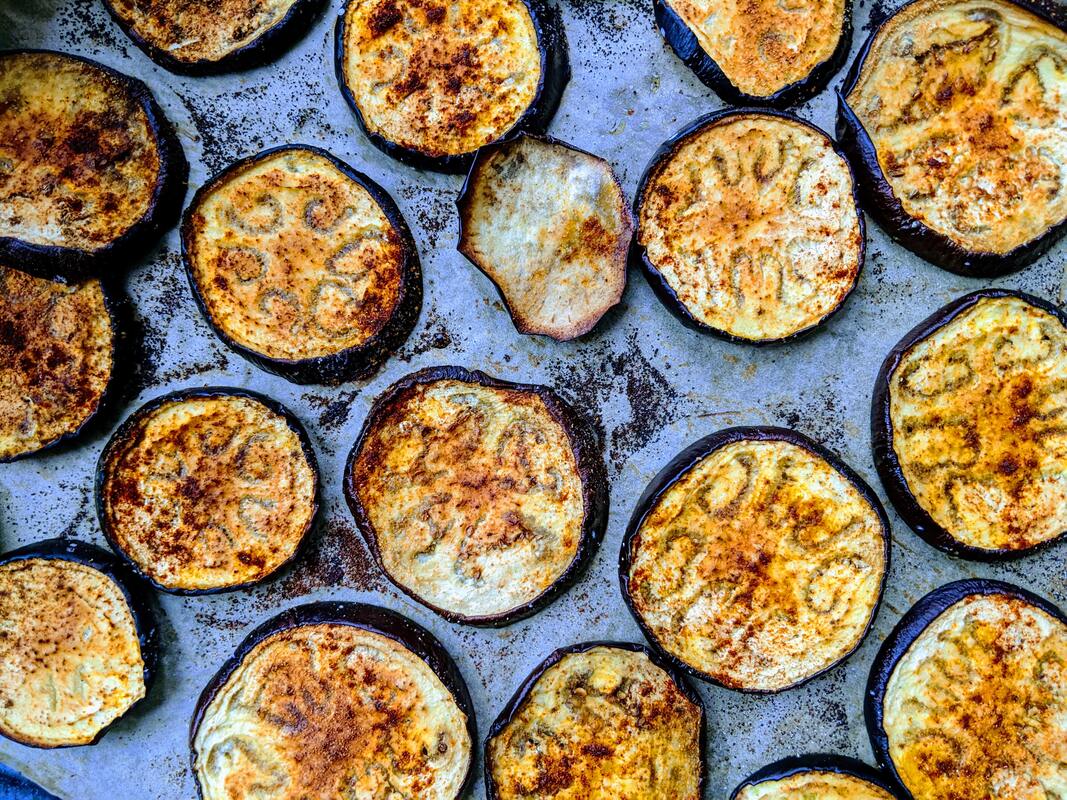(aka PUFAs!)Saturated fats are fatty acids with carbon chains that are fully loaded (or saturated) with hydrogen bonds. These chains stack perfectly on top of one another, making them solid at room temperature. Think butter, lard, and coconut oil. Unsaturated fats have unfilled hydrogen bonds, creating kinks in their carbon chains which keeps them from stacking on top of one another uniformly. These kinks make them liquid at room temperature. Poly-unsaturated (poly- means many) fats have multiple kinks in their fatty acid chains and mono-unsaturated fats (mono- means one) have one kink. Sesame and avocado oil are naturally produced unsaturated fats; olive oil is a naturally occurring mono-unsaturated fat. While humans love categories, all naturally occurring fats are actually a combination of poly-, un-, and mono-unsaturated fats. Butter, for example, is 25% mono-unsaturated. Why Clear Veggie Oils Are Problematic
"These now rancid fats trigger a cascade of inflammatory processes in the body. This is an issue because clear veggie oils are everywhere from healthy snack foods to fried food at both fancy and fast-food restaurants. We can get all the polyunsaturated fats we need by consuming Whole Food sources of nuts, seeds, & cold water fish. The abundance of clear veggie oils, however, has tipped our fat ratios out of balance. The primary PUFAs to look out for are*: canola oil, soybean oil, cottonseed oil, safflower oil, grapeseed oil, & sunflower oil Get this: the ideal ratio of polyunsaturated Omega 6 (Linoleic Acid, LA) to Omega 3 (Alpha-linolenic Acid, ALA) is 1:1... But the average America has a ratio of ~20:1! This stark imbalance means major inflammation in the body (It’s also the underlying reason why so many health professionals recommend fish oils, or Omega 3s). It makes sense that most people - even health-conscious ones - have an overabundance of rancid PUFAs in their life. Of course anything fried is going to present your body with inflammatory omegas, but ready-made snacks like cookies, chips, crackers, dressings, and sauces are some of the biggest offenders. Since clear veggie oils are often subsidized and very cheap, they are used for baking, frying, and sautéeing at even the fanciest restaurants. It's impossible to avoid every single PUFA as a modern human, but bringing awareness and avoiding them as much as you can will work wonders! Fatty Takeaways
*You CAN find good quality veggie oils that are cold-pressed such as walnut, flax, and sunflower even; however, these are very few and far between, quite expensive, and must be stored in dark bottles away from light and heat.
Nightshades are a fascinating family of over 2,000 species of plants including: Ashwagandha, Bell peppers (aka sweet peppers), Bush tomatoes, Eggplant, Goji berries, Ground cherries , Hot peppers (such as chili peppers, Jalapenos, habaneros, chili-based spices, red pepper, and cayenne pepper), Paprika, Pepino (aka pepino melon), Pimentos, Potatoes (but not sweet potatoes), Tomatillos, & Tomatoes While many nightshades are tasty, many are quite deadly, like the notorious Locoweed (Datura stramonium) or Belladonna (Atropa belladonna). Nightshade sensitivity is an underlying cause in many inflammatory conditions today, particularly those including: muscle and joint pain, morning stiffness, arthritis, insomnia, heartburn, GERD, and autoimmunity. Along with soy, many common nightshades are relatively new to the Western and European diets, not arriving to North America until the 18th century. In fact, the tomato was initially used only as an ornamental plant because it was believed to be poisonous like some of its relatives. Despite their relative new-ness to the Western diet, nightshades are everywhere today: french fries, mashed potatoes, tomatoes, pizza, hot sauce, and let’s not forget tobacco. Here’s why you might want to reduce or avoid these powerful plants all together for a period of time: 1. They are “calcinogenic”. This means they can cause soft tissues to calcify (calcinosis) due to their positive effect on blood calcium levels. The body does not like high blood calcium, so the quickest way to remedy this situation is to deposit the extra calcium into the soft tissues. Each hypercalcemic episode lasts only a few moments but also leaves a small deposit behind. Over time, these deposits lead to the condition known as calcinosis, contributing to hardening of the vasculature. 2. They contain acetylcholinesterase inhibitors. Solanine and similar glycoalkaloids found in nightshades inhibit the breakdown of the neurotransmitter acetylcholine. This causes extended muscle contractions and a major reason why those sensitive to nightshades experience morning stiffness. Solanine also disturbs digestive function (common in IBS-sufferers), gene expression of intestinal cells, and inhibits proteolytic enzyme activity. 3. They contain nicotine, a substance that is both addictive and inhibits proper inflammation in the body when out of balance.
And let's not forget saponins... 5. Saponins can poke holes in your gut - All plants contain saponins, but Nightshades are quite high in an especially corrosive class of them. Saponins are detergent-like compounds that protect plants from predation by dissolving cellular membranes. This is great for protecting the plant’s seeds from predation, but not so great when those saponins damage the cells that line our gut (enterocytes). Saponins can literally poke holes through our cells’ protective walls, creating a case of leaky gut. Essentially, the holes allow things to pass through that shouldn’t be in our bloodstream. While some saponins are beneficial and allow for the absorption of certain minerals without harming the cells, others can be more corrosive and damaging to our intestinal wall. Glycoalkaloids, abundant in Nightshades, are one such class of saponins that aren’t so gentle. Glycoalkaloids (alpha-solanine and alpha-chaconine in potato, alpha-solanine in eggplant, and alpha-tomatine in tomato) are very well studied and have revealed issues with absorption and inflammation in many animal studies. For people dealing with systemic inflammation, autoimmune conditions, and issues with digestion, taking a break from Nightshades is a wise choice. The low-level toxic exposure from glycoalkaloids can aggravate the issues we are trying to resolve. Resources:
In, F. T. A., Out, F. T. A., & Reintroductions, P. ALL ABOUT NIGHTSHADES. McFarland, E. (2013). The Link between nightshades, chronic pain and inflammation. GreenMedInfo LLC. Robertson, P., & Roberts, P. (2003). The Solanaceae and their paradoxical effects on arthritis and other degenerative disease states |
Eileen Brantley & Amy WrightWe are Herb Girls Athens, LLC. Read our blog! Archives
November 2022
Categories
All
|









 RSS Feed
RSS Feed
